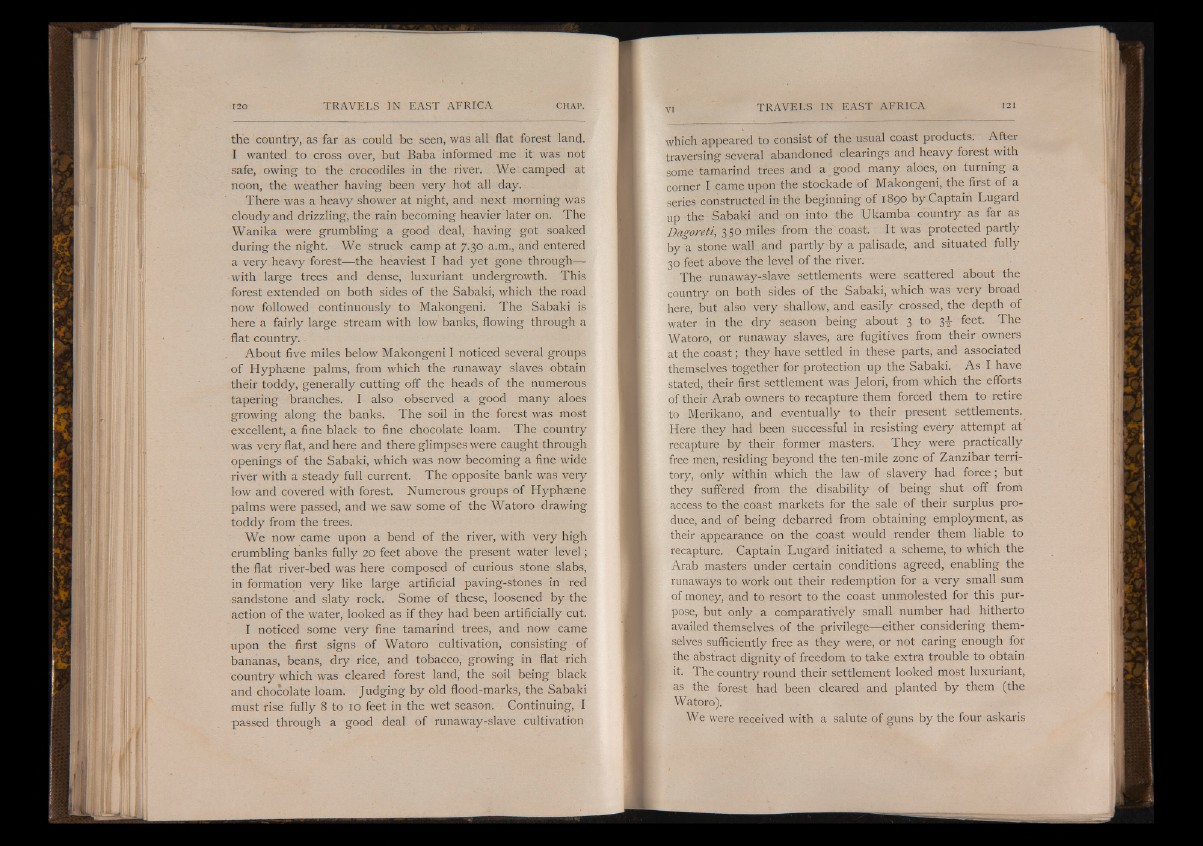
the country, as far as could be seen, was all flat forest land.
I wanted to cross over, but Baba informed me it was not
safe, owing to the crocodiles in the river. We camped at
noon, the weather having been very hot all day.
There was a heavy shower at night, and next morning was
cloudy and drizzling, the rain becoming heavier later on. The
Wanika were grumbling a good deal, having got soaked
during the night. We struck camp at 7.30 a.m., and entered
a very heavy forest— the heaviest I had yet gone through—
with large trees and dense, luxuriant undergrowth. This
forest extended on both sides of the Sabaki, which the road
now followed continuously to Makongeni. The Sabaki is
here a fairly large stream with low banks, flowing through a
flat country.
About five miles below Makongeni I noticed several groups
of Hyphaene palms, from which the runaway slaves obtain
their toddy, generally cutting off the heads of the numerous
tapering branches. I also observed a good many aloes
growing along the banks. The soil in the forest was most
excellent, a fine black to fine chocolate loam. The country
was very flat, and here and there glimpses were caught through
openings of the Sabaki, which was now becoming a fine wide
river with a steady full current. The opposite bank was very
low and covered with forest. Numerous groups of Hyphaene
palms were passed, and we saw some of the Watoro drawing
toddy from the trees.
We now came upon a bend of the river, with very high
crumbling banks fully 20 feet above the present water level;
the flat river-bed was here composed of curious stone slabs,
in formation very like large artificial paving-stones in red
sandstone and slaty rock. Some of these, loosened by the
action of the water, looked as if they had been artificially cut.
I noticed some very fine tamarind trees, and now came
upon the first signs of Watoro cultivation, consisting of
bananas, beans, dry rice, and tobacco, growing in flat rich
country which was cleared forest land, the soil being black
and chocolate loam. Judging by old flood-marks, the Sabaki
must rise fully 8 to 10 feet in the wet season. Continuing, I
passed through a good deal of runaway-slave cultivation
which appeared to consist of the usual coast products. After
traversing several abandoned clearings and heavy forest with
some tamarind trees and a good many aloes, on turning a
corner I came upon the stockade of Makongeni, the first of a
series constructed in the beginning of 1890 by Captain Lugard
up the Sabaki and on into the Ukamba country as far as
Dagoreti, 350 miles from the coast. It was protected partly
by a stone wall and partly by a palisade, and situated fully
30 feet above the level of the river.
The runaway-slave settlements were scattered about the
country on both sides of the Sabaki, which was very broad
here, but also very shallow, and easily crossed, the depth of
water in the dry season being about 3 to 3-!- feet. The
Watoro, or runaway slaves, are fugitives from their owners
at the coast; they have settled in these parts, and associated
themselves together for protection up the Sabaki. As I have
stated, their first settlement was Jelori, from which the efforts
of their Arab owners to recapture them forced them to retire
to Merikano, and eventually to their present settlements.
Here they had been successful in resisting every attempt at
recapture by their former masters. They were practically
free men, residing beyond the ten-mile zone of Zanzibar territory,
only within which the law of slavery had force; but
they suffered from the disability of being shut off from
access to the coast markets for the sale of their surplus produce,
and of being debarred from obtaining employment, as
their appearance on the coast would render them liable to
recapture. Captain Lugard initiated a scheme, to which the
Arab masters under certain conditions agreed, enabling the
runaways to work out their redemption for a very small sum
of money, and to resort to the coast unmolested for this purpose,
but only a comparatively small number had hitherto
availed themselves of the privilege— either considering themselves
sufficiently free as they were, or not caring enough for
the abstract dignity of freedom to take extra trouble to obtain
it. The country round their settlement looked most luxuriant,
as the forest had been cleared and planted by them (the
Watoro).
We were received with a salute of guns by the four askaris